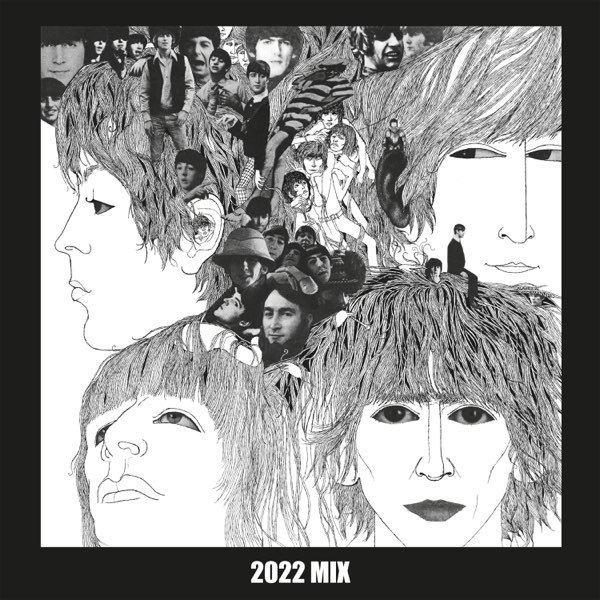Revolver Sounds Better Than Ever
[Apple Corps Ltd/Capitol/UMe, 2022]
From documentaries to reissues, books and more, Beatles fans have been spoiled with new(ish) material for the better part of the past half-decade. The band’s entire career has been so thoroughly documented, it’s hard to believe there’s anything left to uncover about John, Paul, George and Ringo.
But year after year, producers and engineers Giles Martin and Sam Okell have gifted listeners with new stereo mixes of several past Beatles records, as well as demos, alternate takes, and more. Now, one of the most groundbreaking and beloved albums of all time, Revolver, is getting that oh-so-special “super deluxe” treatment.
This project, first released in 1966, is when the band looked at themselves in new light and surely began to explore the limits of their music potential, laying the groundwork for future experimentations. It was a transitional moment for the Fab Four and an even more profound offering for fans. It’s one of those rare, truly “timeless” works of art that still manages to capture the hearts of listeners a half-century later.
I won’t withhold any personal biases: Revolver helped steal my artistic virginity. It was a landmark record, one that helped to push my interests beyond typical melodic structures and trusted pop-rock formulas. I began to turn my gaze towards more abstract, atmospheric and enveloping creations. Tracks like “For No One” and “Here, There and Everywhere” have made my heart heavier and my tear ducts more productive – possibly forever – and I still liken my first time listening to “Tomorrow Never Knows” to visiting some surreal other world.
That said, remixing this project feels so much more significant than some of the other reissues. Like every Beatles album until Abbey Road, Revolver was originally released in mono and many of their experimentations, despite being innovative, were a bit buried in their original recording. The Abbey Road remix sounded like an unnecessary cash-grab; the same procedure for the White Album was mostly hit or miss. However, and much to my delight and surprise, Revolver sounds better than ever.
Take the aforementioned “Here, There and Everywhere.” The soothing vocal harmonies in the background of the track shine easily outshine the original. Likewise, the strings in “Eleanor Rigby” sound bolder and thicker than before. Martin and Okell aren’t just playing the loudness game here; they’ve taken careful attention to enhancing overlooked details without disrupting the project’s original dynamics.
Other tracks such as “I’m Only Sleeping” and “Doctor Robert” seamlessly evolve when placed in a stereo context. The remix of the latter forces you to remember just how cohesively the band performed during this era. They were an unstoppable unit, each of them born to become musicians. Similarly, the John Lennon-dominated “I’m Only Sleeping” now sounds even more panoramic, immersive and enveloping. Beatles fans will probably fixate more on the loudness of Paul McCartney’s yawn just before the song’s second bridge than its overall dramatic sonic improvement. But that’s what die-hards do, right?
With the release of these remixes, there will undoubtedly be dismissive purists; these aren’t quite the songs they heard in middle school. But as a fellow Beatles sycophant in my adolescence, hear my plea: Get over yourselves, mono fans. Stop clinging to the past! Embrace change!
What Martin, Okell and company were able to accomplish is nothing short of incredible. Some of the best Beatles songs of all time are on this record, and they sound better than they ever have. George Harrison’s commanding guitars of “She Said She Said,” McCartney’s elated piano on “Good Day Sunshine” and the explosive horns and vocals on “Got to Get You Into My Life” have always been the stars of their respective tracks, and these remixes allow the listener to be more profoundly aware of the nuances and prowesses within these incredible instrumentals.
“For No One” has always been one of my all-time favorite songs. I couldn’t begin to guess how many times I’ve listened to it. Yet until this reissue, I was fairly unaware of the intricacy of the rhythm section. It’s not too loud, not too overbearing in any capacity; it simply sounds more present. The same can be said for the group vocals on “Yellow Submarine,” where every voice can be clearly and intimately heard.
Still, not every track sees significant enhancement. As cool as it is to hear a punchier, recontextualized opener in “Taxman,” the pounding bass and rhythms are a bit distracting, and the song feels somewhat rushed. George receives further percussive eclipse on “I Want to Tell You,” on which Ringo Starr’s snare is way too loud. Regardless, these are only minor blemishes on slightly altered tracks. The only true disappointment comes from a key moment on the record, “And Your Bird Can Sing.” Martin and Okell continue the same formula that has benefitted every other track; however, the instrumental here ends up sounding more exposed and broken up than the original. The rhythm guitars are too much in the spotlight, making the track sound more choppy than textured.
These gripes, at the end of the day, are inconsequential. This easily stands as the best version of Revolver out there. It’s like revisiting the otherworldly paradise of musical-exploration first created by “Tomorrow Never Knows.” This time, however, you return with contemporary technology, curiosity and knowledge. Turn off your mind, relax, float downstream and enjoy this modernized masterpiece.
Listen here:

